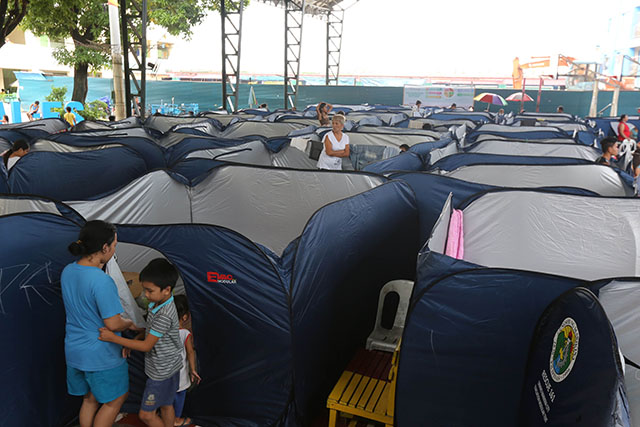Marikina City government is earning applause on social media for its perceived innovation in sheltering affected residents of the recent monsoon showers.
Social media users uploaded pictures of how Marikina officials gave modular tents to displaced families of the flood-prone region to respect their privacy.
Modular tents.the best ka Marikina City. Super ready na kayo sa kahit ano mang kalamidad..samantalang yung iba lugar saka lang nakakaisip ng solusyon pag nasalanta na ulit sila..✌✌✌✌✌. Parang pulis lang pag tapos ang kumusyon saka sila dadating..pelikula lang ang peg!???
— Arlene Javier (@ayen242004) August 12, 2018
According to the official website of Marikina, Mayor Marcelino “Marcy” Teodoro decided to set up the modular tents to particularly protect women and children while they temporarily seek refuge from the torrential rains.
The tents were provided by Markina’s Rescue 161 team, an emergency response unit under the local government. It can accommodate up to seven people. They were set up at Bulelak Gym and other schools in Marikina used as evacuation centers.
Initiative from other LGUs
There were also pictures of similar modular tents found in Makati as well.
Twitter user @michsantillan shared that the Olympia Evacuation Center in Makati has 24 tents to accommodate affected residents. The center has a mobile kitchen, shower, toilet and even a breastfeeding room.
Displaced residents in other areas affected by the flooding—like Manila—were sheltered in evacuation centers in shared spaces.
Felix Abad, head of the Manila Disaster Risk Reduction and Management Office, said that Manila evacuees have a whole building for themselves—not just tents.
In an interview with a news outlet, Abad said, “Limang palapag ‘yun. ‘Di po ‘yung nakikita natin sa social media na kawawa sila.”
A former physician at the evacuation center confirmed his statement. “Natatawa ako sa news. Ang ipinakita was ‘yung complex ng Marikina. Sa amin building na [may] room,” Dr. Gina Pardilla said.
Apparently, the Baseco Evacuation Center was built in 2013 to accommodate evacuees of such calamities.
The problems with evacuation centers
LGUs usually offer public schools and gymnasiums as evacuation centers in their areas whenever calamities strike. There are times buildings are specifically erected for that purpose, as is the case in Manila.
However, there is little room for privacy as different families share the same open area. There are instances that diseases and infections are passed on from one family to the next.
In December 2011, the Facebook page of Habitat for Humanity Philippines shared a snapshot of families taking refuge in an evacuation center, where cartons served as temporary beds.
In November 2013, a picture surfaced that showed the situation of displaced families in a cramped evacuation center after Typhoon “Yolanda” hit the country.
In December 2017, the LGU of Salay, Misamis Oriental shared a picture of families in an evacuation center due to Typhoon Vinta.
There have been previous reports on the health conditions of evacuation centers, which have been generally unfavorable.
In 2013, evacuees in Baseco, Manila suffered colds, fever and loose bowel movement due to the spread of diseases in the compound.
In 2017, displaced residents in Marawi lost their lives in evacuation centers after suffering from various diseases brought about by the unsanitary environment.
In February 2018, evacuees in Albay had diarrhea after drinking water from a nearby contaminated rainwater tank.

